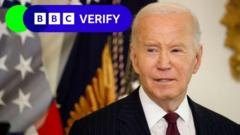In a surprising turn of events, President Joe Biden has issued a sweeping pardon to his son, Hunter Biden, amidst growing scrutiny over the implications. Following Hunter’s conviction for felony gun and tax charges, the White House had previously stated that a pardon was off the table. Yet, Biden's announcement over the weekend, citing a “miscarriage of justice,” has ignited a fierce backlash from Republicans who argue that this contradicts his earlier pledges to uphold the integrity of the justice system.
Biden's Controversial Pardon for Son Hunter Shakes Political Landscape

Biden's Controversial Pardon for Son Hunter Shakes Political Landscape
President Biden's unexpected pardon of Hunter Biden raises questions about justice and nepotism.
The controversy started when Hunter Biden pleaded guilty in federal court on multiple charges this summer. Despite prior assurances from the administration that Joe Biden would refrain from intervening in his son's legal matters, the president's recent remarks have reopened discussions about the precedent and ethicality of presidential pardons.
During a news conference, White House Press Secretary Karine Jean-Pierre had reiterated the administration's stance—“Our answer stands, which is no”—in response to questions about a potential pardon. In stark contrast, Biden's comments on Sunday emphasized the unfair treatment Hunter received, suggesting a shift in his position.
The nature of the pardon itself is unprecedented, as it covers an extensive timeframe of offenses from 2014-2024. Political analysts note that it is uncommon for a president to issue leniency before sentencing has occurred, adding to the concerns raised by critics. An unusual case, Hunter’s pardon mirrors examples from past administrations, including Bill Clinton and Donald Trump, but nevertheless stands out due to its familial connection.
Biden's actions have resurfaced criticism of his predecessor’s pardons as well, underscoring the complexities and potential conflicts inherent in the use of executive power. The ongoing debate suggests a need for clearer guidelines regarding presidential pardons and their implications.
This contentious political moment is far from over, as Hunter Biden is set to face sentencing later this month, leaving the ramifications of his father’s intervention uncertain.
As this developing story unfolds, the implications of Joe Biden's actions remain a topic of heated discussion and debate across the political spectrum.
During a news conference, White House Press Secretary Karine Jean-Pierre had reiterated the administration's stance—“Our answer stands, which is no”—in response to questions about a potential pardon. In stark contrast, Biden's comments on Sunday emphasized the unfair treatment Hunter received, suggesting a shift in his position.
The nature of the pardon itself is unprecedented, as it covers an extensive timeframe of offenses from 2014-2024. Political analysts note that it is uncommon for a president to issue leniency before sentencing has occurred, adding to the concerns raised by critics. An unusual case, Hunter’s pardon mirrors examples from past administrations, including Bill Clinton and Donald Trump, but nevertheless stands out due to its familial connection.
Biden's actions have resurfaced criticism of his predecessor’s pardons as well, underscoring the complexities and potential conflicts inherent in the use of executive power. The ongoing debate suggests a need for clearer guidelines regarding presidential pardons and their implications.
This contentious political moment is far from over, as Hunter Biden is set to face sentencing later this month, leaving the ramifications of his father’s intervention uncertain.
As this developing story unfolds, the implications of Joe Biden's actions remain a topic of heated discussion and debate across the political spectrum.


















